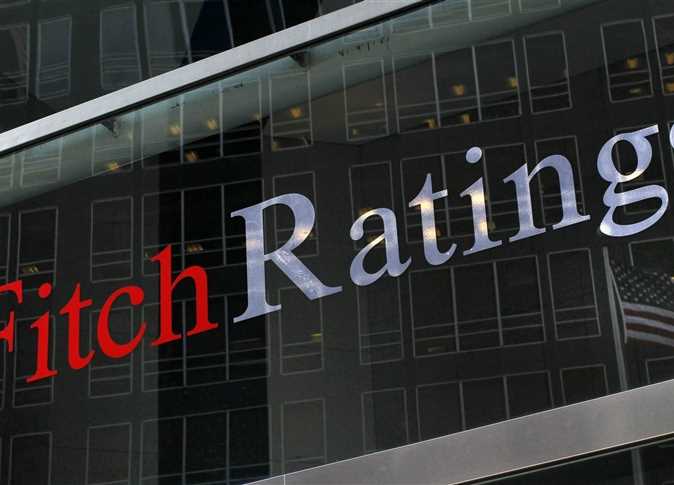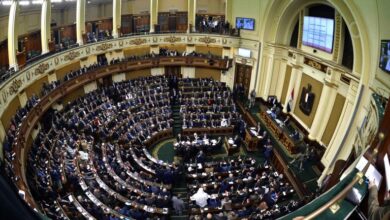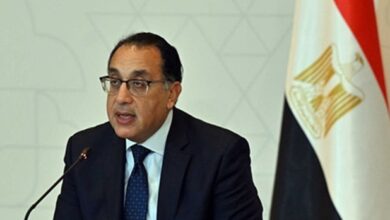It’s been more than a week since deadly clashes between protesters and security forces broke out in several cities around Egypt, and in the meantime, President Mohamed Morsy’s solutions to confront the turbulence have been quickly thinning out.
Instating a curfew and declaring a state of emergency in the three canal governorates of Port Said, Suez, and Ismailia — which witnessed the fiercest fighting and the highest death tolls — proved to be an utter failure. Residents there decided to openly defy the curfew and either protest en masse or, as in Ismailia, people creatively organized a nightly football tournament.
At the capital in Cairo’s Tahrir Square and in front of the presidential palace, clashes between protesters and security forces are ongoing, as the latter continues to exhaustedly face ever-persistent protesters.
It’s become obvious that security-oriented solutions are not working out for Morsy, but political alternatives are facing a similar stalemate.
Amid ongoing efforts by independent political figures to arrange a meeting of opposition forces and the Muslim Brotherhood, the call of reform leader and Dostour Party head Mohamed ElBaradei seems to be a breakthrough.
ElBaradei called on the Brotherhood, the Salafi Nour Party, the Minister of Interior, and, most importantly, the Minister of Defense to meet with the opposition to find a possible exit from the current political deadlock.
But even if heeded, this may do little to stem the anger on the streets.
Including the Minister of Defense Abdel Fattah El-Sisi is seen as an attempt by ElBaradei to guarantee the seriousness of the dialogue, according to observers; however, this awaits the green light from Morsy and the Brotherhood.
“As we have said, we are open to all calls for dialogue, but we have major reservations about the interference of the army in political issues,” Sobhy Saleh, a leading figure in the Brotherhood's Freedom and Justice Party, tells Egypt Independent.
"This does not mean totally rejecting the call, we are still in the phase of studying it," he adds.
The National Salvation Front (NSF), led by ElBaradei and other opposition figures, has set five demands that must be met before coming to the negotiating table. These include sacking the Cabinet and forming a coalition government, forming a committee to look into the contentious articles of the new Constitution passed in December, sacking Prosecutor General Talaat Abdullah, forming an independent fact-finding committee to investigate the violence against protesters in Port Said, as well as legalizing the position of the Muslim Brotherhood group.
Earlier this week, the president’s office rejected the NSF’s proposal to form a national salvation government. “There is only two months or less left before holding the parliamentary elections. Then there will be a true national salvation government that reflects the street,” presidential spokesperson Yasser Ali told Al-Masry Al-Youm.
Presidential adviser Pakinam El-Sharkawy also asserted in a conference following the latest national dialogue session that forming a new cabinet is impractical, reiterating the president's support for Prime Minister Hesham Qandil’s government.
Saleh says any call for a dialogue should be open and without preconditions.
“We understand that every party can present a possible agenda for the dialogue, but to enforce certain conditions beforehand is crippling,” he argues, adding that it is not in the hands of the ruling FJP party to achieve the NSF’s demands.
Forming a new government now is not feasible, says Saleh, since according to the Constitution, the parliamentary majority has the right to form the cabinet. “Forming a cabinet now is meaningless. Who is going to accept to head a cabinet that will be sacked after a few months when the new parliament is elected?”
Other demands
Another issue of contention is the prosecutor general, who was appointed by Morsy after the president passed a constitutional declaration in late November, which gave him sweeping powers and made his decisions irreversible. Replacing the former prosecutor general with the incumbent Abdallah was one of these decisions.
But Saleh says Abdallah’s appointment is legal according to the current Judicial Authority Law.
As for investigations into the Port Said and Suez violence, he adds that they are already underway by the judiciary. “What does the NSF want? Most of their demands are impossible to achieve or have already been achieved,” he says.
The Brotherhood also has no issues with legalizing its position, he says, adding, “We are awaiting the new NGOs law and will be the first to register.”
“I think this demand should be also directed at the NSF, the Popular Current, April 6, and other political movements that are not registered. We want the opposition to set an example of the values they are calling for before they ask others to do so,” he adds.
The results of the latest national dialogue sessions attended by representatives of mostly-Islamist parties, and boycotted by the NSF, show no difference from Saleh's line of thought.
Morsy pledged to form a committee of 10 members, half of whom will be legal and constitutional experts, to examine the disputed constitutional articles and present recommendations to the upcoming parliament.
"Amending [articles in] the Constitution cannot happen unless a parliament, with its two branches, discuss and agree on the changes. This cannot happen before a year from now and it is in the hands of the upcoming elected majority, which we do not control," Saleh says.
The street speaks
Whether cosmetic or practical, political maneuvers will arguably fail to douse the fury on the streets, which has been simmering for days and resulted in tens of deaths and hundreds of injuries nationwide.
Observers say the issues at hand are far beyond any form of dialogue, and that any concessions on the political level will not satisfy the anger amongst the masses, which has grown further with the recent developments of the last days.
Thousands marched on Monday in the funeral procession of the two latest victims of police brutality. Mohamed al-Gendy, a member of the Popular Current, was allegedly tortured inside Gebel Ahmar, a Central Security Forces camp. Gendy died in hospital Monday morning after disappearing on 28 January from Tahrir Square.
The hospital said he had been in a car accident, but a human rights lawyer said that he had clear torture marks on his body and accused the hospital of changing Gendy's arrival date to cover up his kidnapping.
Amr Saad passed away Sunday evening after being shot during clashes in front of Ettehadiya Palace on Friday.
This as well as the evolving story of Hamada Saber. Video footage shows security forces dragging Saber, 48, through the streets, stripping him naked and beating him with batons before forcing him into an armored vehicle.
Saber on Sunday disavowed earlier statements he made to prosecutors that he had been attacked by protesters, saying that it was, in fact, security forces who stripped and beat him.
“I do not believe that there will be any concessions. The Brotherhood will keep offering only security exits and their aim is not to calm the streets as much as to get out of the situation with the least possible losses,” says Ashraf El-Sherif, professor of Islamist movements.
Sherif argues that Morsy's administration is trying, through propositions of a national dialogue, to deliver a message to their US counterparts that the situation is under control.
“Morsy's administration wants to sit with the NSF to separate them from street protests, in turn, delegitimizing protesters and deeming them thugs,” he adds.
The Brotherhood has consistently called out the NSF for giving the violence on the streets a political cover, asking member parties to denounce instead of legitimize it.
Rabab El-Mahdy, professor of political science at the American University in Cairo, says the Brotherhood would be willing to offer some cosmetic solutions, such as amending the elections law and rewriting some contentious parts of the Constitution. The problem, however, is that both the Brotherhood and the NSF are failing to recognize the real reasons behind the recent street action, which she says is beyond elections and the Constitution.
“The real concessions needed here are radical policy changes — that is if Morsy really wants to contain street anger,” she says, adding that the NSF has no control over the protesters in the street in the first place.
“Morsy needs to understand the causality here. He needs to know that he will be giving concessions, if any, in the wrong direction. He has to know that those in the streets are neither NSF affiliates nor thugs,” she adds.
El-Sherif says the street's demands revolve around justice, accountability, ending police brutality as well as social and economic reform, which contradict the Brotherhood's ideology.
“Political concessions with the opposition are possible, but would this lead to less anger in the streets? I doubt it.”
“The revolution's genuine reforms contradict with the Brotherhood's ideology,” he argues.




